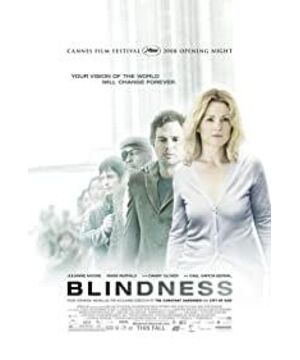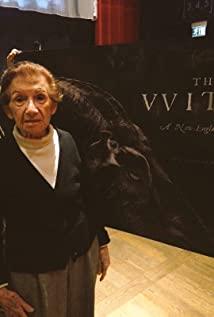But the light still terrifies me.
Blind flu brings people such a world, milky darkness. People grope in the light and survive.
"Blind Influenza", I think, is a film that has not been seen much recently. I haven't read the original, so I can't comment. When many people comment on this film, they always like to talk about humanity. As far as my own perception is concerned, I don't think the director wants to use this film to dig deeply into human nature. Order is the key word that comes to my mind the most from watching. When the first person lost his sight, it was on the street, in the traffic, and the first thing he disrupted was the smooth and slow order of public transport. No one knew why there was a traffic jam ahead. Before everyone knew the inside story, there was no sympathy or understanding. Some just blamed those who disrupted the order and honked their horns to show their dissatisfaction. From that moment on, I think, the story has already begun, and panic swept over the streets, not because the Japanese was out of sight, but because order was broken. Likewise, the Japanese who first went blind, puzzled by his own blindness, was still able to take it easy; it was the villain who stole his car under the guise of good intentions that angered him. The cause of his uncontrollable moment is still the moment when order is broken.
Because of blindness, because more and more people are blind, because of the accidents caused by blindness, because of the panic caused by these accidents, the city has lost its original order, so the ruins are growing uncontrollably in the originally prosperous city. Blindness is not life-threatening, but endangering people's confidence in life. Compared with the increasingly desolate city, this abandoned sanatorium was originally chaotic. The first batch of patients were admitted, and they did not need a new order. A dozen people can completely bring the provisions of the original world into the present. life is just inconvenient. No one asked how the medical research was going because everyone knew they had time to wait. Despair arises after the original order cannot be maintained. More and more people are pouring in, and the good and the bad are mixed. The violent institutions in the outside world ignore the morality in the sanatorium, and the original moral concept completely collapsed. The third ward becomes the supervisor, bringing the primal and dark in order, simply because they have the symbol of the violent institution - the gun. The symbolic meaning of this gun is indeed much stronger than its actual use. The fear of this gun by people who cannot see it is an extension of the trust and fear of the violent institutions in the original world. In the same way, when the despicable villain smashed the TV screen, smashed the government image, and stood in front of the microphone, he got the right to speak. That is to say, the power of the media becomes the weapon of the tyrant in such an extreme situation.
I don't think it was a plot impossibility and an oversight for the director, or the writer, to design the only visible heroine to lead the house without taking advantage of her. Walking into that nursing home from the original order, she just wanted to take care of her husband and maintain the original family order. Before she started killing, she didn't think about establishing a new order through herself, and she didn't even dare to tell others that she was different. Because of being that "special", she is in danger of being deported from "the country", which means she is in danger of losing her family. She understands her husband's infidelity, not because she's the Virgin, but because it's the only way to catch some normalcy in the chaos. She chooses to live according to the order of existence that others have chosen, which is understandable, even taken for granted. Because she controls the survival of others, which means that bloody killings come first. We, on the bottom line of morality, cannot force a kind woman to have no fear or hesitation about picking up a butcher knife. It was only when the order of others had caused the loss of an innocent life that she began her actual operation: precisely when the majority of the people could agree with her killing, and when moral reconstruction needed to begin.
Because we live so long in an orderly society, we ignore the laws of survival. Although these laws are often ghostly roaming around us. Guaranteeing survival and mastering the rules of other people's survival after survival is the only road that every human social group must go through. In the name of law and morality, we want us not only to survive, but also to have life. People, groping in this milky white light, can see only the outline of order.
View more about Blindness reviews











